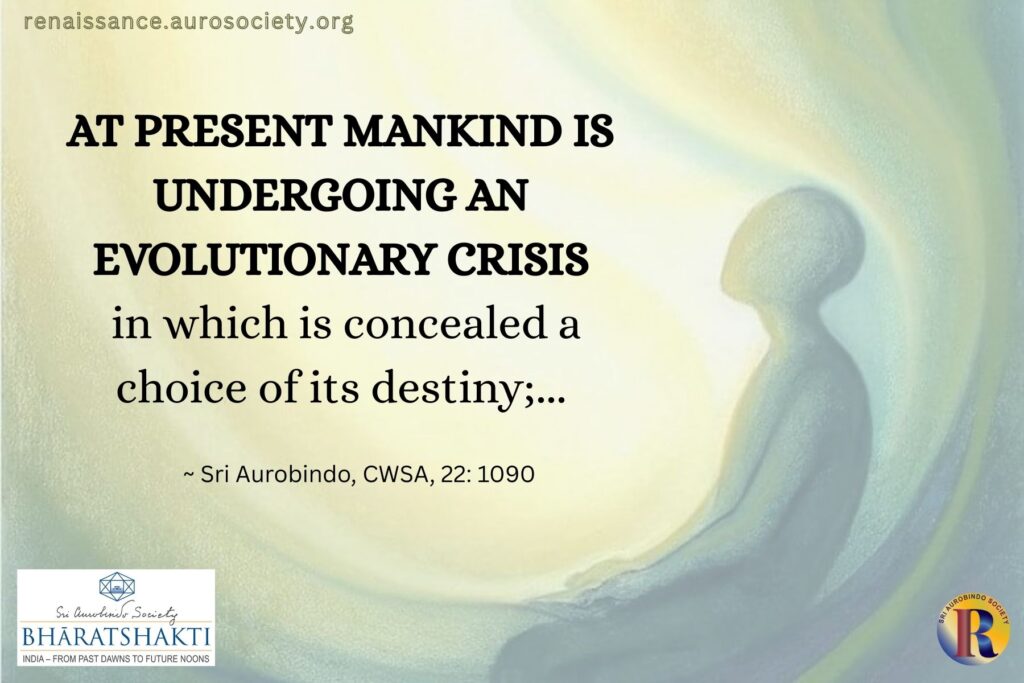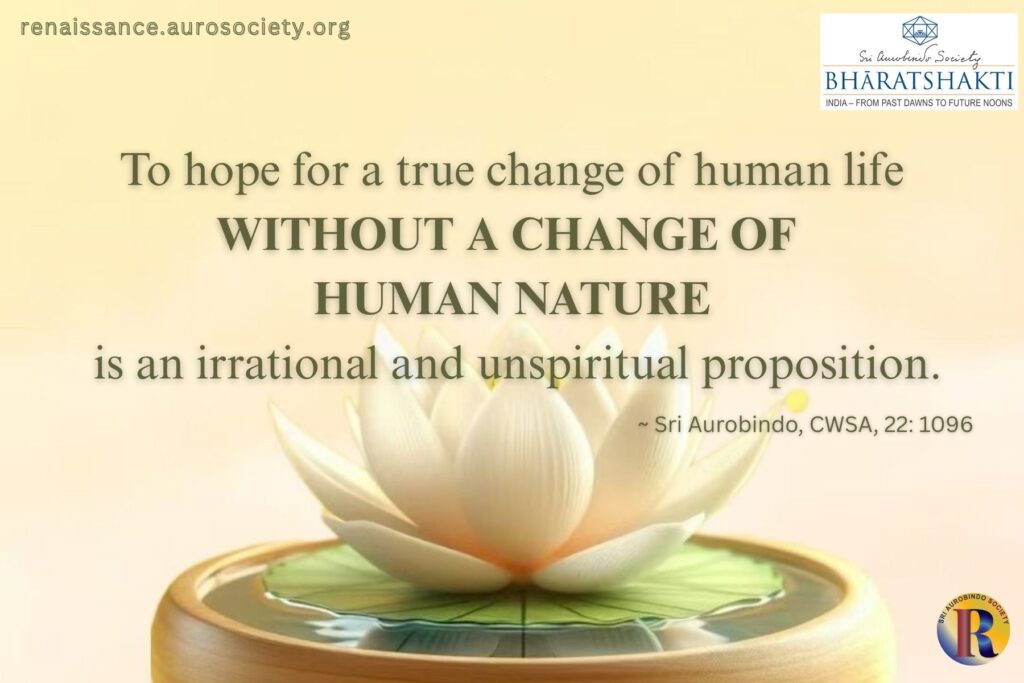Volume II, Issue 6
Author: Sri Aurobindo
Editor’s Note: In several letters written to his disciples, Sri Aurobindo emphasised unlimited patience and perseverance because Integral Yoga demands a complete transformation of outer nature.

There can be no doubt about the Divine Grace. It is perfectly true also that if a man is sincere, he will reach the Divine.
But it does not follow that he will reach immediately, easily and without delay. Your error is there, to fix for God a term, five years, six years, and doubt because the effect is not yet there. A man may be centrally sincere and yet there may be many things that have to be changed in him before realisation can begin. His sincerity must enable him to persevere always—for it is a longing for the Divine that nothing can quench, neither delay nor disappointment nor difficulty nor anything else.
(Sri Aurobindo, CWSA, Vol. 29, pp. 116-117)

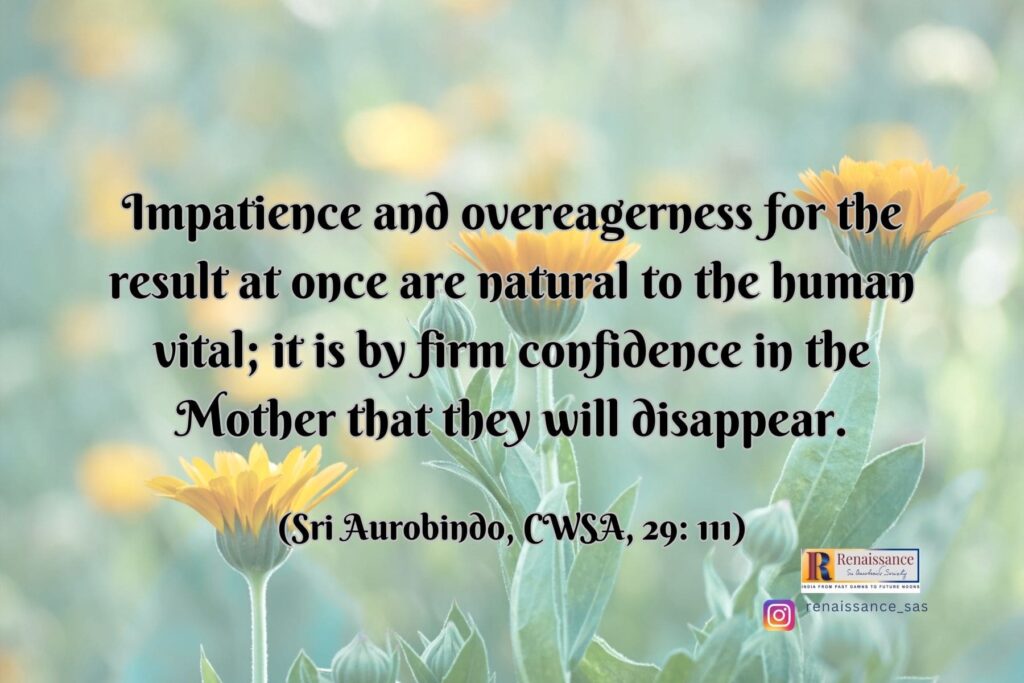
It is true that a great patience and steadfastness is needed. Be then firm and patient and fixed on the aims of the sadhana, but not over-eager to have them at once. A work has to be done in you and is being done; help it to be done by keeping an attitude of firm faith and confidence.
Doubts rise in all, they are natural to the human physical mind—reject them. Impatience and overeagerness for the result at once are natural to the human vital; it is by firm confidence in the Mother that they will disappear. The love, the belief in her as the Divine to whom your life is given,—oppose with that every contrary feeling and then those contrary feelings will after a time no longer be able to come to you.
* * *
. . . Sadhana is a thing which takes time and needs patience. There are often periods of quiescence in which a working is going on behind of which the mind is not aware—all seems then to be inert and dull; but if one has patience and confidence, the consciousness passes through these periods to new openings and things which seemed to be impossible to effect at that time, get done.
The impulse to rush away is always a mistake—perseverance in the path is the one rule to cling to and with that finally all obstacles are overcome.
* * *
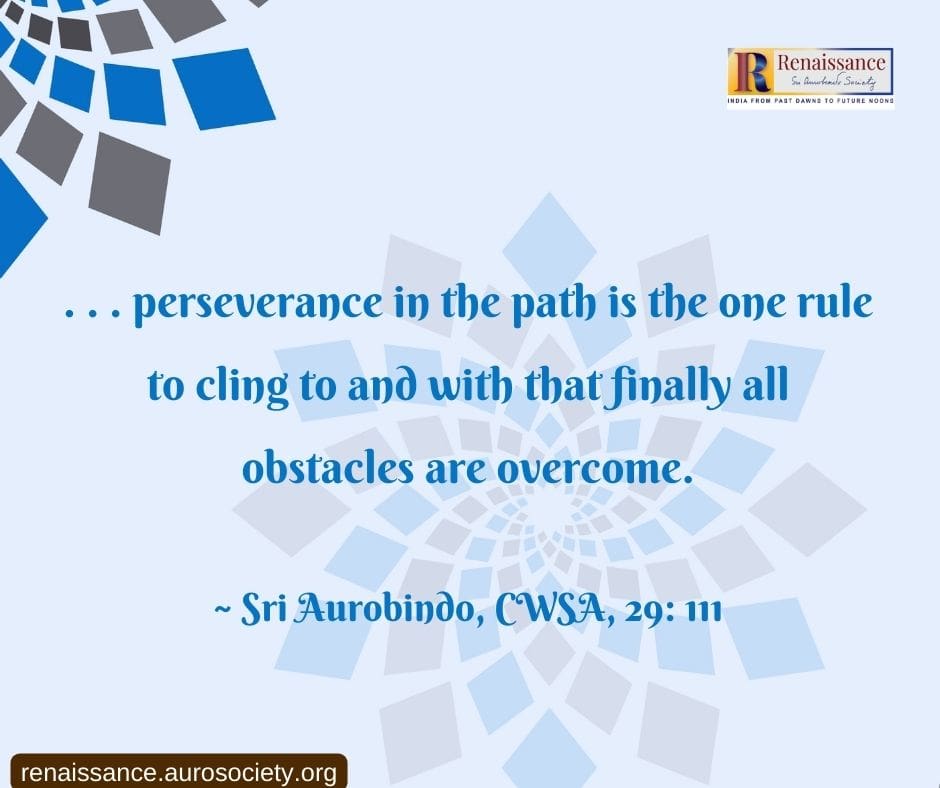
Impatience is always a mistake, it does not help but hinders. A quiet happy faith and confidence is the best foundation for sadhana; for the rest a constant opening wide of oneself to receive with an aspiration which may be intense, but must always be calm and steady.
Full Yogic realisation does not come all at once, it comes after a long preparation of the Adhara which may take a long time.
* * *
In a more deep and spiritual sense a concrete realisation is that which makes the thing realised more real, dynamic, intimately present to the consciousness than any physical thing can be.
Such a realisation of the personal Divine or of the impersonal Brahman or of the Self does not usually come at the beginning of a sadhana or in the first years or for many years. It comes so to a very few; mine came fifteen years after my first pre-Yogic experience in London and in the fifth year after I started Yoga. That I consider extraordinarily quick, an express train speed almost—though there may no doubt have been several quicker achievements.
But to expect and demand it so soon and get fed up because it does not come and declare Yoga impossible except for two or three in the ages would betoken in the eyes of any experienced Yogi or sadhaka a rather rash and abnormal impatience. Most would say that a slow development is the best one can hope for in the first years and only when the nature is ready and fully concentrated towards the Divine can the definitive experience come.
To some rapid preparatory experiences can come at a comparatively early stage, but even they cannot escape the labour of the consciousness which will make these experiences culminate in the realisation that is enduring and complete. . .
It is a matter of fact and truth and experience, not of liking or disliking, two things which do not usually sway me. It is the fact that people who are grateful and cheerful and ready to go step by step, even by slow steps, if need be, do actually march faster and more surely than those who are impatient and in haste and at each step despair or murmur. It is what I have always seen—there may be instances to the contrary and I have no objection to your being one,—none at all. I only say that if you could maintain “hope and fervour and faith”, there would be a much bigger chance—that is all. . .
* * *
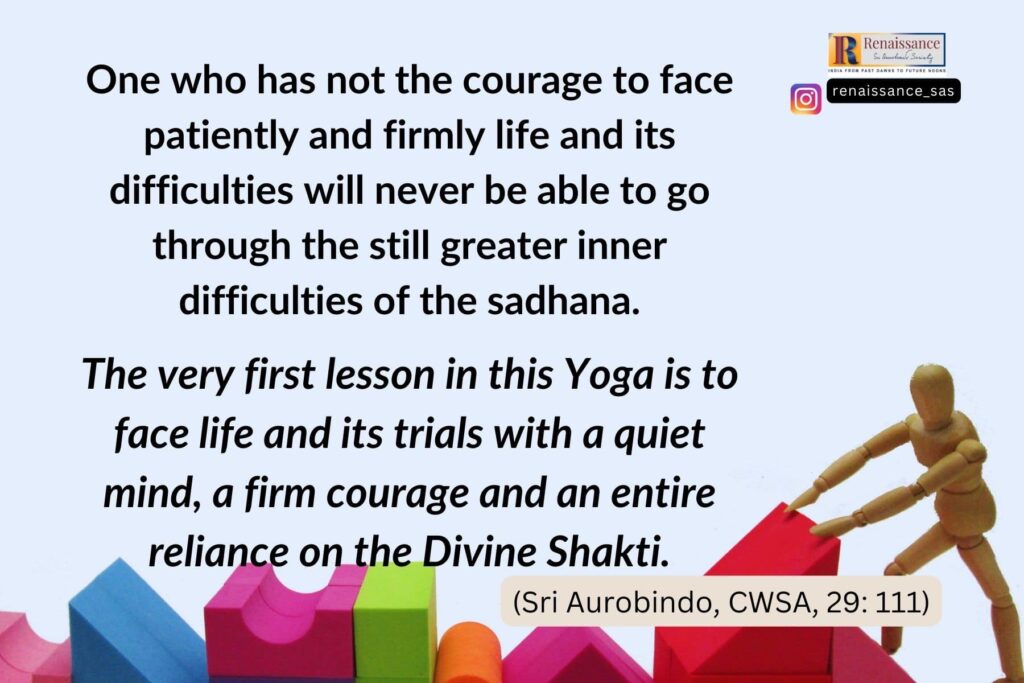
You say after several years you have not changed your nature. I only wish the external nature were so easy to transform that it could be done in a few years. You forget also that the real problem—to get rid of the pervading ego in this nature—is a task you have seriously tackled only a short time ago. And it is not in a few months that that can be done. Even the best sadhaks find after many experiences and large changes on the higher planes that here much remains to be done. How do you expect to get rid of it at once unlike everybody else?
A Yoga like this needs patience, because it means a change both of the radical motives and of each part and detail of the nature.
It will not do to say — “Yesterday I determined this time to give myself entirely to the Mother, and look it is not done, on the contrary all the old opposite things turn up once more; so there is nothing to do but to proclaim myself unfit and give up the Yoga.” Of course when you come to the point where you make a resolution of that kind, immediately all that stands in the way does rise up—it invariably happens.
The thing to be done is to stand back, observe and reject, not to allow these things to get hold of you, to keep your central will separate from them and call in the Mother’s Force to meet them. If one does get involved as often happens, then to get disinvolved as soon as possible and go forward again. That is what everybody, every Yogin does—to be depressed because one cannot do everything in a rush is quite contrary to the truth of the matter.
A stumble does not mean that one is unfit, nor does prolonged difficulty mean that for oneself the thing is impossible.
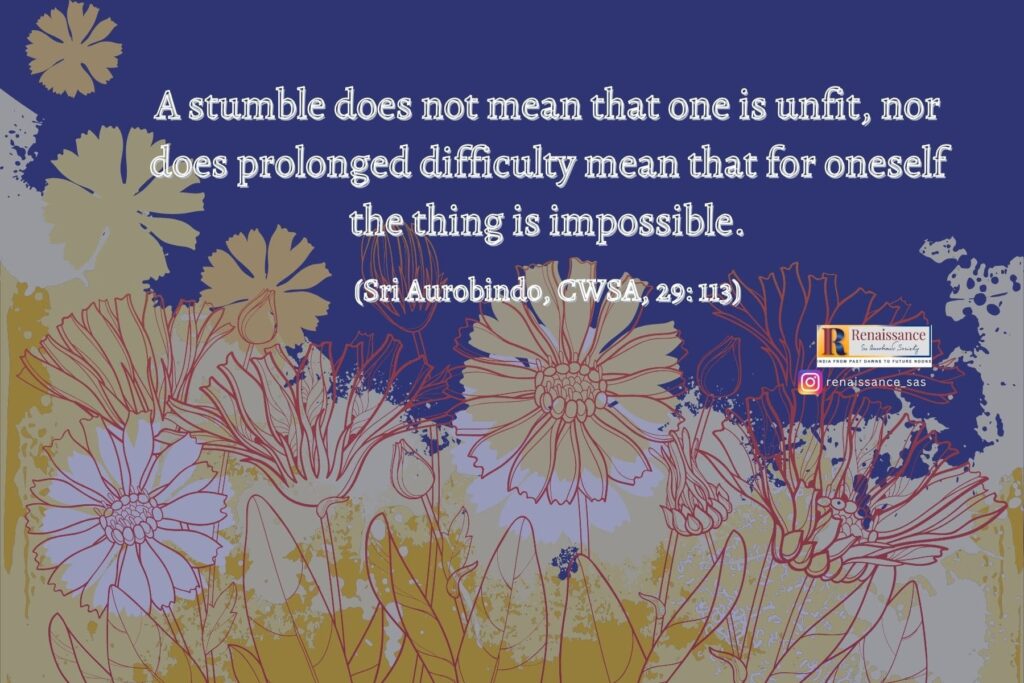
The fact that you have to give up your ordinary work when you get depressed does not mean that you have not gained in steadiness—it only means that the steadiness you have gained is not a personal virtue but depends on your keeping the contact with the Mother—for it is her Force that is behind it and behind all the progress you can make.
Learn to rely on that Force more, to open to it more completely and to seek spiritual progress even not for your own sake but for the sake of the Divine—then you will go on more smoothly. Get the full psychic opening in the most external physical consciousness. That and not despondency is the lesson you ought to draw from your present adverse experience.
(Sri Aurobindo, CWSA, Vol. 29, pp. 111-114)
Read: The Mother’s Words on Transforming the Vital

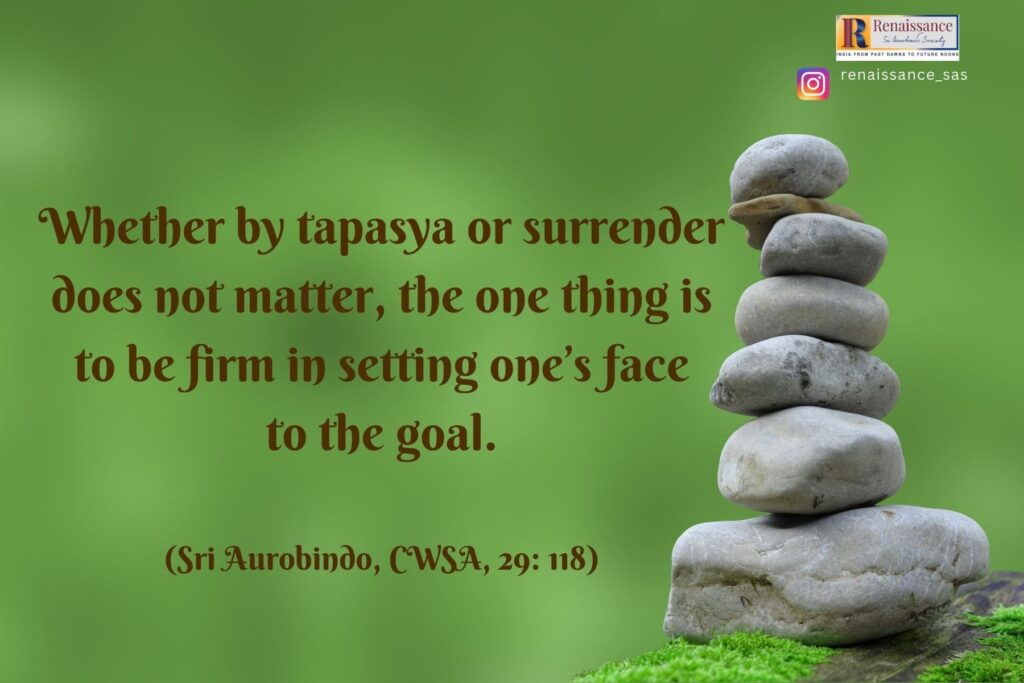
Whether by tapasya or surrender does not matter, the one thing is to be firm in setting one’s face to the goal. Once one has set one’s feet on the way, how can one draw back from it to something inferior? If one keeps firm, falls do not matter, one rises up again and goes forward.
If one is firm towards the goal, there can be on the way to the Divine no eventual failure. And if there is something within you that drives, as surely there is, falterings or falls or failures of faith make no eventual difference. One has to go on till the struggle is over and there is the straight and open and thornless way before us.
(Sri Aurobindo, CWSA, Vol. 29, p. 118)

Are all Yogis who have meditated to effect and had great realisations in their inner consciousness perfect in their nature? It does not look like it to me.
I am unable to believe in absolute generalisations in this field, because the development of spiritual consciousness is an exceedingly vast and complex affair in which all sorts of things can happen and one might almost say that for each man it is different according to his nature and that the one thing that is essential is the inner call and aspiration and the perseverance to follow always after it no matter how long it takes or what are the difficulties or impediments—because nothing else will satisfy the soul within us.
(Sri Aurobindo, CWSA, Vol. 35, p. 230)

Also read:
Yogic Initiation and Aptitude: No Free Pass
~ Design: Beloo Mehra


